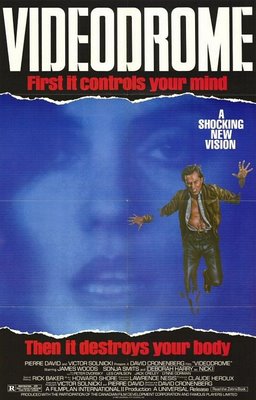
VIDEODROME
Canada, 1983, 89 minutes, Colour.
James Woods, Sonja Smits, Deborah Harry.
Directed by David Cronenberg.
Videodrome is one of the key films in the work of David Cronenberg. He began making short films and then an international impact with his 1975 film Shivers. He followed it up with Rabid, The Brood and Scanners. Then came Videodrome and more international success and reputation. After this he went much more upmarket and international with his adaptation of Stephen King’s The Dead Zone, The Fly and Dead Ringers with Jeremy Irons. During the 1990s he made a number of significant films: The Naked Lunch, M Butterfly and the controversial Crash, finishing the decade with Existenz. During the first decade of the 21st century he made the British film, Spider with Ralph Fiennes and A History of Violence which featured in competition at the Cannes Film Festival.
In his early films, Cronenberg was concerned with the human body, parasites, the strange mutations that happen in people’s bodies as well as in their minds and their psychologies. With Videodrome he focuses on the media and its interaction with human beings, affecting their brains as they watch. It is all done in the context of a manipulative company showing snuff movies. These themes continued during some of his other films.
The film stars James Woods, always a hyperkinetic presence, especially in his earlier films.
1. The impact of the film? The niche audience for this kind of science fiction, fantasy, portrayal of contemporary technology and its abuses? Audiences who enjoy horror films?
2. The work of David Cronenberg in the 70s and 80s? Variations on the same story, infected societies? The sickness of individuals in societies? Responsibilities, dangers and the consequences? Science, politics and technology? The conventions of the horror genre? Gore and its effects? The atmospheric sound engineering? The score?
3. The Canadian settings, Toronto, the cityscapes and streets? A western city? Audiences identifying with the city? An authentic city for this kind of fantasy? Sealed and enclosed, the past, the dosshouse? The future and the station, media piracy? Squalid atmosphere?
4. The pessimism of the film, the pessimism about human nature in Max, in Nicki? The criminals, their power? Control and exploitation? Killing and the impact of deaths? The social and political implications?
5. Cronenberg’s use of conventions, audience expectations? The elements of humour, deadpan irony, poses?
6. The need for Videodrome? The philosophical aspects and discussions? The real world on television? The eye the retina of the mind? The impact of introverted energy, extroverted energy? Light through the eye – leading to a philosophy of exploitation and killing the enemy? The philosophy of the word – and video made flesh? The biblical overtones? The North American settings, soft society, elitism?
7. Technology and television, the growth, through the structures? Waking and the effect? Entertainment? TV news and information? Piracy and taping? The irony of Malaysia, Pittsburgh? Video and pornography on video, snuff movies? The manipulators and control? Sex and titillation? Japanese art, soft to the crude? To participation, film fantasies and hallucinations and living them? The dead being preserved? Bianca O’Blivion? Nicki and destruction?
8. The technological strength, the channels, eighty-three? Audiences and what people want? The Rena King Show? Nicki’s radio service? O’ Blivion – theory, deaths? The edited tapes and their conversion? Interactions, Marsha and the agent, the producer, the cathode ray (and its heat) refuge? Bianca and the library? What kind of world was Cronenberg creating?
9. Videodrome – audience curiosity, being repelled? Max and his looking? The parties, Nicki and participation, Marsha and her talk, the descriptions? The belief, the pirating and its origins – and the irony with Harlan? O’ Blivion and the use of Videodrome, the daughter and the suffering leading to control? Nicki dying? Who was using whom? The convex lens, the spectacles, the glasses for the three-dimension, the nucleus? Shop, the show, inserting Videodrome – and killing all? Yet all not being destroyed – and the destruction via Nicki?
10. James Woods as Max, ordinary, an exploiter, the mornings, his work, the Japanese, video, piracy, curiosity, the talk show, Marsha, Pittsburgh, O’ Blivion’s visit, the tape, the hallucinations and Nicki? The spool and the machine? The laser and Nicki? The secretary, the convex lens and the test hallucinations? Bianca – and the experience with the stomach, the gun and the video? Killing and rejection? Bianca and control, the warehouse? Nicki and new life? The evil within him?
11. Deborah Harry and Nicki, the video, talkback? The red dress? The program, sexuality, cutting her, the video, in the hallucinations? Slapped and lashed? The dead Marsha? Her Videodrome death, reappearance and the end?
12. The contrast with Bianca, poised, the screen for the father, the tapes, belief in Bianca, the library? The return, control and not dead?
13. O’ Blivion and the brain, the tumour, the theories, the favoured monologue, talks, the exploitation?
14. The pirate, smooth, reaction, the traitor, using people? De-handed?
15. The partners, their decisions, death?
16. Marsha, ugly, exploitation – killed in the fantasy?
17. The violence and the audiences, audiences wanting to see violence, the soft world, the Videodrome attraction, sickness, the causing of growths, the effect on the brain? Leading to the killer instinct, associated with sex?
18. The purpose of this kind of technological fable of illness, sex and violence?